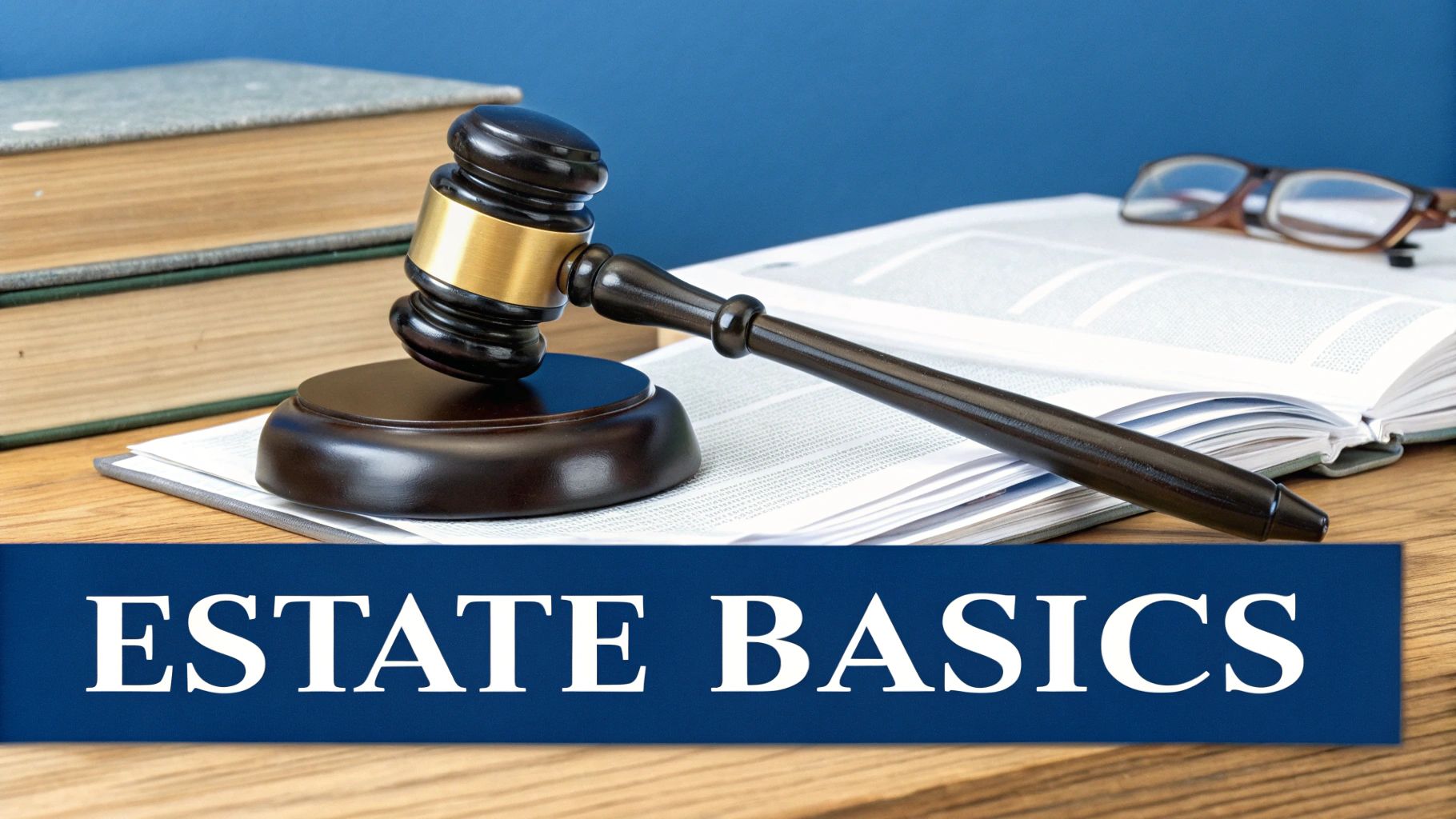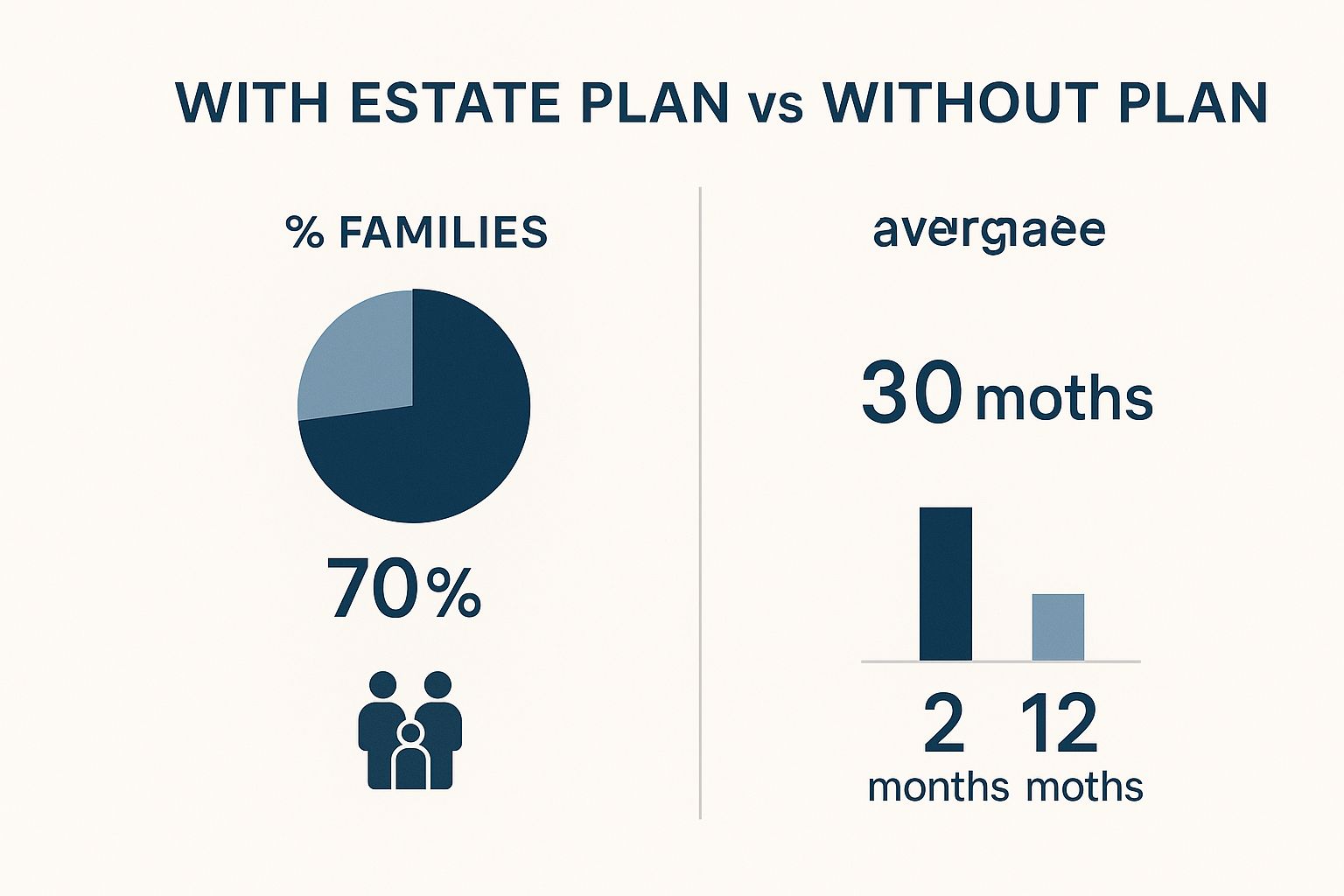Estate Planning for Families: Protect Your Loved Ones
- dustinjohnson5
- May 3, 2025
- 14 min read
Why Most Families Are One Document Away From Disaster

Many families believe estate planning is only for the wealthy. However, middle-class families often face devastating consequences from inadequate planning. This isn't just about money; it's about protecting loved ones from emotional turmoil and financial hardship. For many, the lack of a simple document, like a will, can trigger a cascade of problems. What truly makes a family prepared?
The Probate Pitfall
One significant risk families face without proper estate planning is the probate process. This legal procedure validates and distributes assets after death. It can become a costly and time-consuming ordeal. Probate courts often require extensive documentation, legal representation, and court fees. These expenses can deplete the estate's value.
What you intend to leave your family could be significantly diminished. Additionally, probate proceedings are public record, potentially exposing your family’s finances.
Discord and Disagreements
Beyond finances, the absence of an estate plan can cause family conflict. Without instructions, disagreements arise about asset distribution, guardianship of minor children, and funeral arrangements. These disputes strain relationships and create lasting resentment during grief. A well-defined estate plan provides clear direction and minimizes misinterpretations.
A significant number of families are unprepared. As of 2025, 55% of Americans lack estate planning documents, leaving families vulnerable. While 83% acknowledge the importance of estate planning, only 31% have a will, according to a Trust & Will survey of 10,000 respondents.
This gap exposes families to unnecessary risk. Younger generations are even less prepared, highlighting the need for awareness. This lack of planning affects middle-class families most, as they underestimate probate costs, which can reach 10% of an estate's value. The emotional toll of intestacy laws (where the state dictates asset distribution) can be equally devastating.
Let's explore the potential impacts of not planning ahead:
The following table illustrates the financial and emotional repercussions families may face without proper documentation:
"The Cost of Failing to Plan"
Consequence | Financial Impact | Family Impact |
|---|---|---|
Probate | Loss of up to 10% of the estate's value due to court fees, legal representation, and administrative costs. Delays in asset distribution. | Increased stress and burden on family members during a time of grief. Potential for disputes and strained relationships over asset distribution. |
Lack of a Will | State intestacy laws determine asset distribution, which may not align with the deceased's wishes. | Uncertainty and potential conflict among family members regarding inheritance. Difficulty accessing funds for immediate needs. |
No Guardianship Designation | Court decides guardianship of minor children, potentially leading to placement with individuals not chosen by the deceased parent. | Emotional distress for children and family members. Uncertainty about the children's future care. |
Unclear Healthcare Directives | Potential for unwanted medical interventions and escalating healthcare costs. Difficulty making medical decisions on behalf of the deceased. | Emotional burden on family members struggling to make difficult medical choices. Potential for disagreement and guilt. |
This table clearly shows the range of difficulties that can arise without a plan. Addressing these issues proactively can save your family significant hardship.
The Power of Prevention
While the consequences of inadequate estate planning seem daunting, the solutions are straightforward. Creating a will, establishing trusts, and designating powers of attorney protect your family’s future. These documents ensure your wishes are respected and your loved ones are cared for. In the following sections, we’ll explore the essential documents every family needs and how they prevent disaster.
The Five Documents Every Family Needs (And Why)

Estate planning is a crucial step in safeguarding your family's future. It's not just about what happens after you're gone; it's about providing security and peace of mind for your loved ones, no matter what life throws their way. The cornerstone of a solid estate plan lies within five essential documents. These legal tools work in concert to ensure your family's well-being, both financially and emotionally.
The Cornerstone: Your Will
A will forms the foundation of any estate plan. It outlines how your assets will be distributed after your passing, which can significantly minimize potential family disputes during a difficult time. This document also allows you to designate guardians for minor children, ensuring they're cared for by individuals you trust. Without a will, these critical decisions are left to the court.
Trusts: Shielding Your Legacy
Trusts, while more complex than wills, offer distinct advantages for families seeking greater control over their assets. They allow for more nuanced distribution strategies and can potentially avoid probate, a often costly and time-consuming legal process. Trusts can also offer long-term asset protection and potential tax benefits, preserving more of your wealth for future generations.
Power of Attorney: Planning for Incapacity
Life is unpredictable, and unforeseen circumstances can leave you unable to manage your own affairs. A Power of Attorney (POA) empowers a trusted individual to handle your finances and make healthcare decisions on your behalf if you become incapacitated. This document is crucial for all adults, regardless of age or current health. A POA ensures bills are paid, medical care aligns with your wishes, and your family avoids unnecessary legal intervention.
Healthcare Directives: Ensuring Your Wishes Are Honored
Healthcare directives, sometimes called living wills, outline your preferences for medical treatment if you're unable to communicate them yourself. This empowers you to make decisions about life-sustaining treatment in advance, ensuring your wishes are respected. When paired with a healthcare POA, these directives provide comprehensive protection for your medical care.
Beneficiary Designations: Streamlining Asset Transfer
While not a standalone document, beneficiary designations on life insurance policies, retirement accounts, and other financial products are essential components of your estate plan. These designations dictate who receives these assets directly, bypassing probate and ensuring a smooth transfer of wealth. Review these designations regularly, especially after major life events like marriage or divorce, to ensure they align with your current wishes.
A data chart illustrating the perceived importance of each document follows:
Importance of Estate Planning Documents
Document | Importance (%) |
|---|---|
Will | 85 |
Power of Attorney (Financial) | 75 |
Healthcare Directive | 70 |
Power of Attorney (Healthcare) | 65 |
Trust | 60 |
Beneficiary Designations | 55 |
The data reinforces the importance of a will as the cornerstone of estate planning, while highlighting the significant supporting roles played by the other four documents.
To further clarify the roles of these documents, the following table provides a comparison of each:
Estate Planning Document Comparison
Document Type | Primary Purpose | When It Takes Effect | Updating Frequency |
|---|---|---|---|
Will | Distribute assets after death | Upon death | As needed |
Trust | Manage and distribute assets, potentially avoiding probate | Upon creation, can be revocable or irrevocable | As needed |
Power of Attorney (Financial) | Authorize someone to manage finances | Upon incapacity or as specified | As needed |
Power of Attorney (Healthcare) | Authorize someone to make healthcare decisions | Upon incapacity or as specified | As needed |
Healthcare Directive (Living Will) | Outline medical treatment preferences | Upon incapacity | As needed |
Beneficiary Designations | Specify who receives assets directly | Upon death of account holder | As needed, especially after major life events |
This table summarizes the key functions and activation triggers for each document, helping to understand their distinct roles within a comprehensive estate plan. While health crises and major life events often prompt people to consider estate planning, with 43% citing medical diagnoses as their primary motivator, a surprising 60% of Americans still lack wills or trusts, leaving their families vulnerable Find more detailed statistics here. Taking the time to create these five documents provides invaluable protection and peace of mind for you and your loved ones. America First Financial understands the importance of securing your family's future. Visit us today to learn more about comprehensive estate planning.
Protecting Your Children Beyond Just Naming Guardians

Naming guardians for your children is a critical piece of estate planning. However, it’s often just the first step. Many parents concentrate on who will raise their children, sometimes overlooking the crucial question of how. A truly comprehensive plan provides a detailed roadmap for their upbringing and financial security, going beyond simply assigning guardianship. This involves considering your values, your children’s unique needs, and preparing for potential future challenges.
Structuring Inheritance for Your Children’s Benefit
Leaving assets directly to minors can create significant problems. Children lack the legal standing to manage their own finances, leaving them open to mismanagement or even exploitation. Furthermore, receiving a large inheritance too early can have detrimental effects. A well-structured inheritance plan is therefore essential.
One common and effective approach is establishing a trust. Trusts offer control over how and when assets are distributed. You can stipulate that funds be used for specific purposes, like education or healthcare. This safeguards their inheritance and helps ensure it’s used wisely. You can also establish staggered distributions, providing financial support at important milestones such as graduation or starting a business. This fosters responsible financial habits and prevents a sudden influx of wealth at a young age.
Choosing the Right People for the Job
Selecting guardians and trustees demands careful consideration. These individuals will play vital roles in your children’s lives, shaping their development and financial future. Think not only about their character, but also their financial stability and capacity to handle the assigned responsibilities. Open communication with potential guardians and trustees is key. Make sure they fully understand your expectations and are prepared for the long-term commitment.
It’s also wise to designate alternate guardians and trustees. Life is full of unforeseen circumstances, and your first choices may become unavailable or unwilling to serve. Having backups in place prevents court intervention and guarantees your children remain cared for by trusted individuals. This proactive planning is paramount for effective estate planning.
Addressing Special Needs
Children with special needs have unique requirements that demand careful planning. A special needs trust (SNT) can provide for their long-term care without jeopardizing their eligibility for government benefits. These trusts are designed to supplement, not supplant, public assistance. They allow beneficiaries to maintain access to crucial programs like Medicaid and Supplemental Security Income. Consulting with an experienced estate planning attorney is vital when creating an SNT to ensure it meets your child's specific needs and adheres to all legal regulations.
Protecting Inheritance from Future Risks
As children grow, they may face unexpected difficulties such as divorce, creditors, or poor financial choices. Proper estate planning can help mitigate these risks. Trust provisions can protect assets from division in divorce settlements or seizure by creditors. This safeguards your legacy and ensures your children, not unintended parties, benefit from your hard work. Anticipating these potential issues is a key element of responsible estate planning. By addressing these complexities, you provide not only financial security but also invaluable guidance as your children navigate life's challenges. Proactive planning now offers greater peace of mind than reacting to crises later. Visit America First Financial to learn more about how we can help secure your family’s future.
Family Trusts: Creating Your Legacy Protection System
Protecting your family's financial future requires more than a simple will. Family trusts offer a robust method for managing assets and ensuring your loved ones are cared for according to your wishes, even after you're gone. Trusts can address complex situations that standard wills often can't, offering significant advantages in protecting your legacy.
Understanding the Power of Trusts
A trust is a legal agreement where a trustee manages assets on behalf of designated beneficiaries. Think of it as a secure container with specific instructions on who can access the contents and under what conditions. This system provides a structured approach to inheritance, guaranteeing your assets are used responsibly and as you intended. For instance, you could specify that funds be used primarily for education, healthcare, or a down payment on a home, providing a level of control a will alone can't offer.
Types of Trusts: Revocable vs. Irrevocable
The two primary types of trusts are revocable and irrevocable. A revocable trust, often called a living trust, can be modified or even terminated by the grantor (the person who created the trust) during their lifetime. This offers flexibility but may provide less protection from creditors. In contrast, an irrevocable trust is difficult to alter once established. Though less flexible, it offers stronger protection from creditors and potential estate tax advantages. Selecting the right trust type is vital, so understanding these differences is crucial for developing a plan that meets your family's needs.
Benefits of Family Trusts: Shielding and Providing
Beyond asset management, family trusts offer a range of benefits:
Avoiding Probate: Trust assets generally bypass the often lengthy and expensive probate process, ensuring a quicker and more private distribution of your estate.
Minimizing Estate Taxes: Depending on the type and structure, trusts can help reduce or eliminate estate taxes, preserving more of your wealth for your beneficiaries.
Protecting Assets from Creditors: Irrevocable trusts, in particular, can shield assets from creditors and legal judgments, safeguarding your family's financial well-being.
Providing for Special Needs: Specialized trusts, such as special needs trusts, can support family members with disabilities without affecting their eligibility for government benefits.
Controlling Asset Distribution: Trusts allow for staggered distributions, preventing young beneficiaries from receiving large sums of money prematurely and encouraging responsible financial management.
For families with complex circumstances, like blended families or children with special needs, trusts can be particularly advantageous. They offer a nuanced approach to inheritance, accommodating unique situations and ensuring your wishes are precisely executed.
Selecting a Trustee: A Critical Decision
Choosing a trustee is arguably the most important decision in establishing a trust. This individual will manage the trust assets and make decisions based on your instructions. Choose someone you trust, who is responsible, and capable of handling financial matters. Consider a professional trustee, such as a bank or trust company, especially for complex trusts. This ensures expert management and impartiality, reducing potential conflicts of interest among family members.
Family trusts provide essential protection that extends beyond basic estate planning. They offer a way to control your legacy, safeguard your assets, and ensure your family's financial security for years to come. For personalized guidance on establishing a trust, consult with an estate planning attorney. They can help you determine the best trust type for your needs and guide you through creating a legacy protection system that truly benefits your family. Visit America First Financial for more information on protecting your family’s future.
Digital Estate Planning: Protecting What Others Forget
Our digital lives are deeply intertwined with our physical ones. This means estate planning now involves considering our digital estates: the online accounts and assets holding both financial and sentimental value. Overlooking this crucial aspect of planning can lead to complications. A well-defined digital estate plan ensures your legacy is handled according to your wishes.
Identifying Your Digital Assets
The first step is taking inventory. List all your online accounts, including social media profiles like Facebook and Instagram, email accounts such as Gmail or Outlook, and online banking platforms. Don't forget cloud storage services like Dropbox or Google Drive.
Also, include digital subscriptions, domain names, and any online intellectual property. Less obvious assets like cryptocurrency holdings, online gaming accounts, and loyalty programs should also be included. This comprehensive list forms the basis of your digital estate plan.
Access and Control: Planning for Incapacity
What happens to your digital life if you become incapacitated? Many platforms have procedures for granting family member access, but these vary. Some require court orders, while others offer designated legacy contacts. Understanding these platform-specific rules is essential.
Creating a clear document outlining your wishes, along with securely stored usernames and passwords, simplifies the process for your loved ones. This proactive approach prevents roadblocks and ensures access when needed. For families with veterans, estate planning may have unique considerations. Learn more about Veterans Estate Planning.
Transferring Your Digital Legacy
Your digital property, like physical assets, needs a transfer plan. Specify who inherits your digital assets and the intended actions for each account. Should social media profiles be memorialized? Do you want online photos archived or your blog continued?
Documenting these wishes prevents confusion and honors your intentions. This is particularly important for assets with monetary value, like cryptocurrency or online businesses, which require specific instructions for access and transfer.
Protecting Privacy and Preventing Identity Theft
Your digital footprint contains sensitive information requiring protection. Your estate plan must address data privacy. Include instructions for deleting accounts, securing sensitive data, and preventing identity theft. This safeguards your reputation and protects your family from potential fraud.
This goes beyond passwords. Consider two-factor authentication, encryption, and up-to-date antivirus software from providers like Norton or McAfee. Implementing these safeguards creates a strong defense against digital threats. Addressing these concerns ensures responsible and secure handling of your digital legacy, giving you and your family peace of mind. Contact America First Financial at https://www.americafirstfinancial.org for guidance on comprehensive estate planning, including protecting your digital assets.
The Family Meeting: Preventing Conflicts Before They Start

Estate planning is about more than just legal documents; it's about clear communication with your family. While potentially difficult, a family meeting is essential to preventing future conflicts and ensuring your wishes are understood. Taking this proactive step can save your family from emotional distress and legal battles later. It's about building understanding and transparency.
Why Have a Family Meeting?
The goal of a family meeting isn't to reveal every detail of your estate plan. Instead, it's to explain the reasoning behind your decisions. Open communication can minimize misunderstandings and resentment, especially when dealing with unequal distributions or complex family dynamics, such as blended families.
For example, if one child receives a larger inheritance due to specific needs, explaining your decision can prevent other children from feeling overlooked. This transparency fosters trust and strengthens family relationships.
How to Conduct a Family Meeting
A successful family meeting requires careful planning. Choose a neutral location and a time that allows for open and honest discussion. Begin by emphasizing your love and concern for your family's well-being. Clearly explain the purpose of estate planning: to protect and provide for your loved ones.
Frame the conversation around your values and goals for your family's future. For example, if education is important to you, explain how your estate plan will support that goal. This approach personalizes the conversation and connects financial decisions to your family values.
Addressing Sensitive Topics
Discussing sensitive issues, such as business succession or the distribution of personal property, needs a thoughtful approach. Clearly explain your decisions and the logic behind them. Be ready to answer questions and listen to concerns.
However, remember that you are not obligated to justify every choice. It is your plan, but sharing your thought process can promote understanding and help reduce the likelihood of disputes later.
Including Adult Children
Involving your adult children in estate planning discussions can be incredibly beneficial. It provides an opportunity to educate them about financial matters and ensure they understand their potential responsibilities. You can discuss their roles as executors, trustees, or guardians.
This empowers them and reduces the burden of decision-making during a difficult time. Remember to respect their boundaries and avoid placing undue pressure on them.
Communicating Values Alongside Assets
Estate planning is not solely about money; it's about the values you cherish. Use the family meeting to share those values and the legacy you hope to create. This adds a deeper meaning to the conversation and strengthens family connections.
This shared understanding can bring your family together during times of grief.
Seek Professional Guidance
If navigating these conversations feels overwhelming, consider consulting an estate planning attorney or a family therapist. They can provide support and help facilitate productive discussions. America First Financial understands the complexities of family estate planning and offers resources to navigate these important conversations. By proactively addressing potential conflicts, you can create a legacy of love and security for your family.
Keeping Your Family Protected Through Life's Changes
Life is full of changes. Marriage, births, divorces, new homes, career shifts, and sadly, illnesses and deaths all reshape your family and its needs. This means your estate plan, that carefully crafted protection for your loved ones, must also adapt. A static plan can become a liability, failing to protect your family when they need it most. This section provides a practical framework for maintaining your estate plan, ensuring it remains a dynamic tool that evolves alongside your family.
Recognizing Life's Triggers for Plan Updates
Certain life events require immediate review and potential modification of your estate plan. Marriage, divorce, and the birth or adoption of a child are significant milestones with profound legal and financial implications. For example, marriage often changes property ownership and inheritance rights, while divorce requires updating beneficiary designations and powers of attorney.
Significant financial changes, such as purchasing a new home, starting a business, or receiving a substantial inheritance, also warrant a plan review. These shifts in your financial situation may require adjustments to asset distribution, tax strategies, and overall estate management. A change in health, either your own or a loved one's, necessitates revisiting your healthcare directives and powers of attorney. These documents are critically important during times of incapacity, ensuring your wishes for medical care are respected and your finances are handled responsibly. Addressing these changes promptly maintains your plan's effectiveness.
Efficient Plan Review: Saving Time and Money
Regular review doesn't require costly attorney visits every year. Start by annually rereading your documents yourself. Familiarize yourself with the contents and identify any sections that no longer align with your current circumstances or wishes. This proactive approach allows you to pinpoint specific areas requiring professional attention, saving you time and money during consultations with an estate planning attorney.
Simple updates like changing beneficiary designations or adjusting asset allocations can often be handled with straightforward amendments, rather than a complete plan overhaul. However, for more complex changes, like establishing a new trust or revising existing trust provisions, consulting an attorney is crucial to ensure legal compliance and proper execution.
Ensuring Access During Emergencies
Your estate plan is only as useful as its accessibility. Keep original documents in a secure but readily accessible location, like a fireproof safe or a safe deposit box. Provide copies to your executor, trustee, and anyone named in powers of attorney.
Create a list of key contacts, including your attorney, financial advisor, and insurance agents. This centralized information is invaluable for family members during emergencies, enabling them to quickly locate important documents and contact relevant professionals. Documenting informal wishes, like funeral preferences or sentimental item distribution, can further minimize stress and potential conflicts during difficult times. This extra step, though not legally binding, provides valuable guidance and helps preserve family harmony. By implementing these strategies, your estate plan remains a dynamic shield of protection for your family, regardless of life’s changes.
For personalized guidance on estate planning, contact America First Financial today. We can help you navigate the process and create a plan that truly protects your loved ones.
_edited.png)
Comments